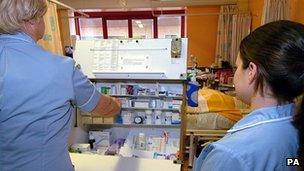Public sector pay bargaining could affect millions
- Published
- comments

Local public sector workers in England could be paid less in the north than the south
It seemed like an afterthought in the Autumn Statement.
But when George Osborne, external raised the issue of local public sector pay bargaining, he must have known he was proposing something which could have a huge effect on millions of workers.
At the moment, public sector wages are all negotiated on a national basis.
Workers do get an extra allowance if they are in London, but a public sector worker is largely paid the same rate whether they're in Hastings, Harrogate or Hartlepool.
The Chancellor wants to investigate whether that should change and has asked the pay review bodies to tell him how more local pay bargaining might work.
That could see the likes of nurses, teachers, council workers and prison officers paid different rates in different parts of the country.
In particular, public sector workers in England could be paid less in the north than the south.
Saving money?
Of course, this looks like another potential deficit cutting measure.
But the government insists its interest in local pay bargaining has nothing to do with saving money, and everything to do with boosting the economy.
It believes relatively high public sector pay rates in some parts of the country are actually damaging the private sector in those areas.

Nurses are one of the groups of workers which could be affected by local public sector pay bargaining
The Institute for Fiscal Studies, external estimates that public sector workers earn less than private sector staff in London.
But the IFS says in the north of England men in the public sector earn about 7% more, external than those in the private sector.
The government says that is making it hard for the private sector to recruit staff as it can't match those pay rates.
That then "crowds out" private sector employment, making it harder for companies to grow and entrenching the north's dependence on the public sector.
So the theory is, lower public sector pay rates in the north could actually lead to a boost in employment and economic activity.
Union reaction
You won't be surprised to know that this is not a message which has gone down well with the trade unions.
The Northern TUC, external does not see why a nurse in Stockton should be paid less than a nurse in Surrey.
And it says instead of boosting the northern economy, it will further depress it, by cutting household incomes and reducing spending power.
It's an issue which has now reached the Commons, and the North East's Labour MPs have plenty to say.
In a debate on the issue, external, Bishop Auckland's Helen Goodman estimated it could take £500m to £1bn out of the regional economy by effectively imposing an average £2,000 pay cut on public sector workers.
And Sedgefield's Phil Wilson, external said even an extended pay freeze for the north's public sector staff would be unfair.
He said: "I do not want public sector workers in North East England to have to face extended periods of austerity because they happen to be working in the wrong part of the country.
"We need to look at the private sector. I want private sector jobs to come to the North East of England, and I want those private sector jobs to have good pay rates.
"The answer to the problem is not regional pay or localised pay - it is a living wage for all our people."
'Potentially damaging'
But the government is unapologetic.
Treasury Minister Chloe Smith, external said: "Private sector pay is more subject to the rates paid by local competitors, the local cost of living and perhaps, in some cases, local turnover rates.
"However, public sector pay is usually set on a one-size-fits-all basis nationally.
"Accordingly, public sector workers can often be paid more than private sector workers in similar jobs in the same area. That has potentially damaging consequences for the economy."
At the moment though the government insists there are no concrete proposals.
It says that it will wait for the pay review bodies to report back in July before deciding what to do next.
It has, though, decided not to include doctors and dentists in the pay review because of fears they could all head south if local pay rates were imposed.
The police have also been excluded from the review.
But that still leaves an awful lot of public sector workers waiting to find out whether they will face another battle with the government.
Sunday Politics will be examining the issue with North East businesses, union officials and MPs on BBC1 at 12:00 GMT on Sunday 15 January,